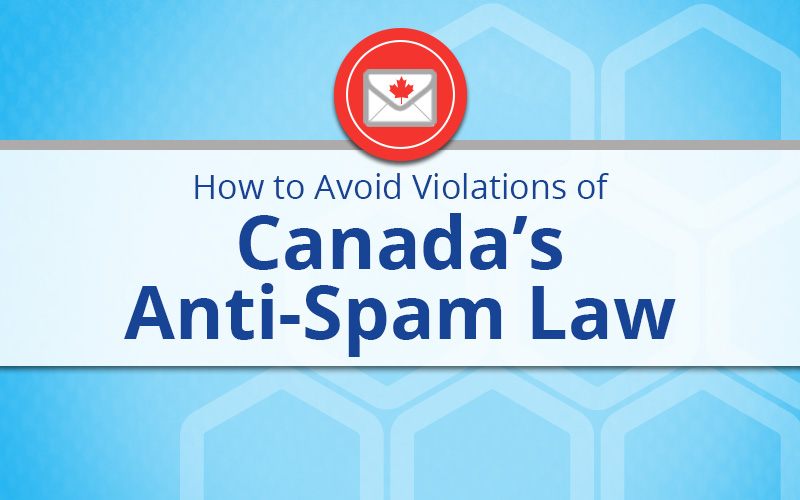Allow us to get straight to the point on an important issue. Our neighbors to the north will begin enforcing their anti-spam law on July 1, 2017. That means if you are sending email to Canadians without acquiring express consent, you could be sued. Seems like a good time for us to review international spam compliance, eh?
What You Need to Know
The United States has one of the most lenient anti-spam laws in the world, CAN-SPAM. If you’re sending commercial email to people living in the U.S., your email must:
- Not be misleading about who you are and what you are offering.
- Include your physical postal address.
- Be identified in some way as an ad if your list is not opt-in.
- Include a clear mechanism for opting out.
- Honor opt-outs within 10 business days.
Currently, in the U.S., you can send marketing messages without an express opt-in as long as you offer an easy way to opt out. This is not a best practice, but it’s not illegal to do so.
In many other countries, including Canada and those in the European Union, marketers are tasked with acquiring express consent. Express consent is also called affirmative consent. It’s a proactive request by a user to receive promotions or newsletters via email. For example, express consent means a subscriber must have filled out a clearly labeled email sign-up form or, on other forms where email addresses are collected, checked a permission box indicating they want to receive email. Pre-checked permission boxes do not count as express consent.
Action Items
If your email collection processes do not include express consent, you’ll need to isolate Canadian subscribers ASAP. Then you can take the following actions:
- If you have implied consent, you can try to acquire express consent via a re-permissioning campaign completed prior to July 1, 2017. You may continue to email Canadian subscribers who confirm their subscription. Subscribers who do not confirm their subscription need to be deleted from your list.
- If a subscriber has made a purchase from you, you can email them for two years without express consent (so long as the subscriber does not unsubscribe during that period). If, after two years, you have not received express consent, the subscriber must be removed from your list.
- If you never acquired any type of consent or are not sure how a Canadian subscriber got on your list, and you are not able to confirm consent with a re-permission campaign, delete them.
You also need to review your email sign-up forms and any other email data collection points. To comply with Canada’s Anti-Spam Law and the European Union’s General Data Protection Regulation, ensure your forms or data collection practices include the following:
- A clear statement about what the individual is signing up to receive (email newsletter, special-offer emails, etc.).
- A statement that the individual may unsubscribe at any time.
- A link to your full privacy policy.
- The name, physical address and phone number of your organization.
- For forms that are not primarily email opt-in forms, include a checkbox with “Yes, I wish to receive email” language. This box may be pre-checked for subscribers in the United States (identified by a country drop-down box), but it should not be pre-checked for any other country.
- Wherever possible, a country field should be required on all opt-in forms to clearly document international subscribers and compliance efforts.
At Katey Charles Communications, we are not attorneys and cannot provide our clients with legal advice. Therefore, we recommend you review the details of Canada’s Anti-Spam Law, which will be enforced starting in July, and the European Union’s General Data Protection Regulation, which will be enforced in May 2018. Consult with an attorney to ensure you are in compliance with international spam laws for your subscribers.
Email Is Powerful Because It’s Permission Based
While you may need to remove some subscribers from your list to comply with these laws, keep in mind that email is powerful because it’s permission based. Email sees the highest return on investment among marketing channels because it’s messaging people want and request. By only emailing those who have told you they want to hear from your company, you’re ensuring that you’ll have an engaged subscriber base who is more likely to convert or make a purchase.
Need Help?
We can help you build an email program based on express consent. Please call 314-918-8088 or email .

